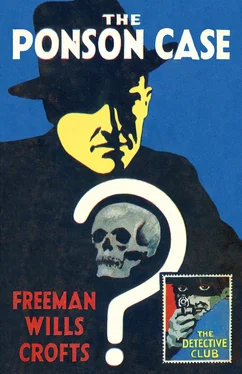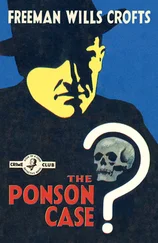In his fifth book, Inspector French’s Greatest Case , Crofts went on to to create his best known character, Inspector Joseph French of Scotland Yard. Fair minded, decent and achieving his results through sheer dogged persistence, Inspector Tanner of The Ponson Case is, in many ways, a blueprint for French.
‘There were already plenty of “character” detectives,’ wrote Crofts in his essay ‘Meet Inspector French’, ‘the lineal descendants, most of them, of the great Sherlock. I tried to make French a perfectly ordinary man, without peculiarities or mannerisms. Of course he had to have some qualities, but they were to be the ordinary qualities of ordinary fairly successful men. He was to have thoroughness and perseverance as well as a reasonable amount of intelligence, just the qualities which make for moderate success in any walk of life.’
This accent on the ‘ordinary’ has led to the charge that Crofts is a ‘humdrum’ writer and his policeman heroes are humdrum (aka boring) characters. This is unfair. It would be far better and a much truer assessment of his books to see his detectives as Everyman characters.
‘French,’ he wrote, to quote once more from ‘Meet Inspector French’, ‘does not leap to his conclusions by brilliant intuition. He begins a case by going and looking for information in those places in which he thinks information is most likely to be found. When he gets the information he swots over it until he grinds out some sort of theory to account for the facts. Very often this turns out to be wrong, but if so, he simply tries again until he thinks of something better.’
If this sounds daunting, don’t worry—it isn’t. One of the great qualities of Crofts’ writing is that it is very enjoyable to read. He loved travel and used a great variety of locations in his books. All of Crofts’ heroes have an engaging interest in the locations they find themselves, from the round Britain cruise of Fatal Venture to the construction of the A3, lovingly described in The Hog’s Back Mystery . In The Ponson Case , for instance, Inspector Tanner ends up in Portugal, where his insular British prejudices are overthrown by the sight of the glittering city of Lisbon.
Crofts doesn’t, thank goodness, go over the same ground again and again, but leads us forward through the story as new facts are discovered and fresh discoveries are made. His style is simple, easy and accessible. There aren’t any literary fireworks but he tells the story in ordinary, everyday language.
In 1929 Crofts, who was always dogged by ill health, retired from the railways. This was made possible by the great success of his books. Together with his wife, Mary, he moved from Northern Ireland to Blackheath in Surrey. He had always loved the countryside, as is evident from the opening of The Ponson Case . ‘A fine old house, finely set on the summit of a low hill and surrounded by wonderful old trees, it seemed to stand symbolical of the peace, security and solid comfort…’
The peace doesn’t last long.
DOLORES GORDON-SMITH
July 2015
CHAPTER I
MYSTERY AT LUCE MANOR
THE dying sun of a July evening shone rosily on the old Georgian house of Luce Manor, mellowing the cold grey of the masonry, bringing out with soft shadow its cornices and mouldings, and softening and blurring its hard outlines. A fine old house, finely set on the summit of a low hill, and surrounded by wonderful old trees, it seemed to stand symbolical of the peace, security, and solid comfort of upper-class rural England.
This impression was not lessened by the outlook from the terrace in front. Below, and already shadowed by the trees beyond from the sun’s rays, was a small Dutch garden, its walks and beds showing up faintly in the gathering gloom. To the right the drive swept off in an easy curve until it disappeared between two rows of beeches, celebrated in all the county round for their age and size. At the side of the house, and reached through a rose pergola, was the walled English garden, with its masses of colour, its laden bushes, and its range of glass houses. In front, beyond the lawn, whose oaks and elms stood singly like sentinels guarding the house, the country rolled away to a line of distant hills, while to the left, an opening in the trees gave a glimpse of the Cranshaw River, with behind a near horizon of tree-covered slopes.
Within, in a large room panelled in black oak, the master of the house sat at dinner. He was alone, the only other members of the household, his wife and his daughter Enid, being from home on a visit. Sir William Ponson, a self-made man, had retired from business some ten years before our story opens and, selling his interest in the large ironworks of which he was head, had bought Luce Manor and settled down to end his days in the rôle of a country squire. Though obviously a nouveau riche , and still retaining the somewhat brusque manners of his hard, northern upbringing, he had nevertheless been received with more cordiality into the local society than usually happens in such cases. For Sir William, though he had thus risen in the social scale, remained a simple, honourable, kindly old man, a little headstrong and short tempered perhaps, but anxious to be just, and quick to apologise if he found himself in the wrong.
It was seldom that Sir William partook of a solitary meal. He was fond of society, and kept open house for all who cared to visit him. He had rented some shooting, and though the fishing in the river was not good, it at least was fishing. The tennis courts were always in perfect condition, and there was a sporting golf course at the neighbouring town of Halford. But it spoke well for Sir William that, of all his acquaintances, those whom he liked best to welcome were his old, somewhat unpolished business friends from the north, by few of whom these pursuits were properly appreciated. In this he had the full sympathy of his wife, a stout, placid lady of uncertain age, who ruled over his household with leisurely, easy-going sway.
Enid Ponson, their only daughter, a young woman of some thirty summers, was a favourite everywhere. Not exactly beautiful, she was yet good to look at, with her pale complexion, dark eyes, and winning smile. But it was her wonderful charm that endeared her to those with whom she came in contact, as well as the sweetness and kindliness of her disposition. That she was unmarried was only explained by the fact that the man to whom she had been engaged had been killed during the Great War. Enid and her father were close comrades and allies. She adored him, while Sir William’s chief thought was centred in his daughter, upon whom he thought the sun rose and set.
When the family were alone it was Sir William’s custom after dinner to join his wife and Enid in the music room, where for hours the latter would sing and play, while her father smoked cigar after cigar, and the elder woman placidly knitted or crocheted. But tonight, being entirely alone, he retired at once from the table to his library, where he would sit, reading and smoking, till about ten or later he would ring for Parkes, the butler, to bring him his nightly tumbler of hot punch.
But ten came, and half past ten, and eleven, and there was no ring.
‘Boss is late tonight, Mr Parkes,’ said Innes, Sir William’s valet, as he and the butler sat in the latter’s room over a bottle of Sir William’s old port, and a couple of Sir William’s three and sixpenny cigars.
‘Sir William is behind his usual hour,’ admitted the butler in a slightly chilly tone. Innes had followed his master from the north and was, as Mr Parkes put it, ‘well in’ with him. The butler therefore thought it politic to be ‘well in’ with Innes, and was usually affable in a condescending way. But the latter’s habit of speaking of Sir William as ‘the boss,’ grated on Parkes’s sensitive ears.
Читать дальше












